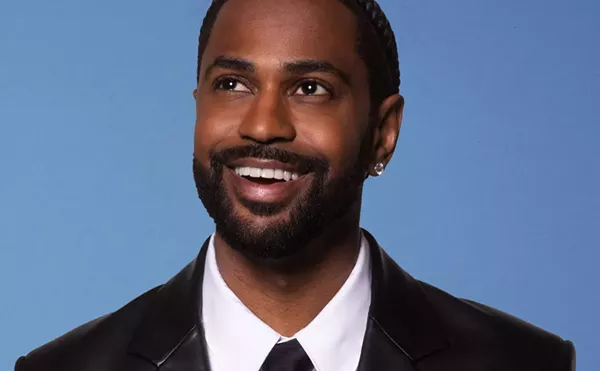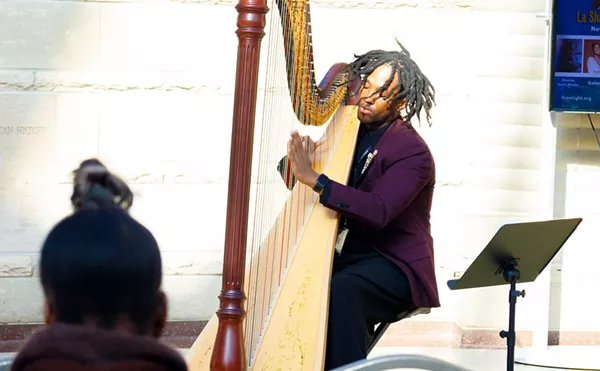
Audio By Carbonatix
[
{
"name": "GPT - Leaderboard - Inline - Content",
"component": "35519556",
"insertPoint": "5th",
"startingPoint": "3",
"requiredCountToDisplay": "3",
"maxInsertions": 100,
"adList": [
{
"adPreset": "LeaderboardInline"
}
]
}
]
“Who wants it like it was before?” asks singer-guitarist Kaia Wilson, taking a rocking roll call of sorts as 3, the third album by queerpunk trio the Butchies, opens with guitars and drums clashing and crashing in classic rock defiance. “Who wants it like Traffic? Like Zeppelin?” For North Carolina’s Butchies, these aren’t rhetorical questions — they’re dares to speak up, to stand up so lines can be drawn and sides can be taken: Either you’re for or against the “good ol’ days” of rock ’n’ roll’s boys club.
Similarly, Stag, the solo debut by Georgia’s Amy Ray, features the Indigo Girl taking on today’s patriarchal music industry. “It’s a stupid, secret, white-boy handshake that we’ll never be part of,” she sneers with more relief than grief, listing countless ways that rock still remains a male space. This isn’t passive commentary for Ray, either — it’s a call to action: “Come on, girls, let’s go right now! Lucystoners don’t need boners!”
Not that any of this is new for either the Butchies or Ray. With roots in the mid-’90s homocore band Team Dresch, the Butchies’ melodic, melancholic rock fuses riot-grrl rhetoric, folk-pop and classic rock with a loud and proud, distinctly queer sensibility. Ray is better known as one-half of the longtime lesbo-duo the Indigo Girls. So for fans who’ve come to expect and respect their unabashedly feminist stances, it’s not surprising that both critique the industry’s sexism on their amazing new albums.
“Everything from the recording studios to the ‘post-punk’ sort of clubs is a constant male space,” Ray responds when asked about her hard-driving, anti-industry anthem, “Lucystoners,” which takes its name from 19th century feminist Lucy Stone. “I think you have to establish yourself in that space and fight against it. I don’t think you have to be intimidated by it, and writing a song about it is a way to make a comment on it.”
It’s in this context of male-dominated opposition — both in industry and culture — that the mere fact that these acts exist becomes a statement in itself. “Of course stereotypes exist,” Wilson says when asked about ways the media and audiences can resist queer women. “But people with preconceived notions about the fact we’re lesbians have their own insecurities.”
Given both acts’ rebellious and activist-heavy musical careers, it was only a matter of time before they crossed paths. “Kaia sent me a tape of the Butchies’ first record before they were going to release it [on Wilson’s label, Mr. Lady],” says Ray, a fan of Wilson since she heard Team Dresch. “When she sent the tape, she said, ‘If we can’t get the resources together to put it out ourselves, would you be interested in it [for release on Ray’s label, Daemon]?’ I was like, ‘Totally!’ We started talking and it just kind of went from there.”
Two years later, the Butchies were opening for the Indigo Girls nationwide, and when Ray started recording her solo album, she invited the trio into the studio. In fact — despite appearances by Joan Jett and the Rock*A*Teens, among several others — it’s the Butchies who define much of Stag’s sound, playing on half the songs and providing a far more punky feel than might be expected from one of the famously folky Indigo Girls.
“I was working on these songs in an electric scenario in my head. When I wrote them, I’d be in front of my amps with my guitar,” Ray explains. “And after touring with the Butchies and watching them play, I thought, ‘This is going to be the core group for the record.’”
“Amy’s had punk in her blood forever, though,” says Wilson. “But we influence each other, and she picked us because she wanted us to do what we’re good at doing. She’s definitely had an influence on our understanding of writing.”
That influence certainly shows up on 3, the Butchies’ most cohesive and, as Ray describes it, “melodic punk” work yet. On it, the trio — Wilson, bassist Alison Martlew and drummer Melissa York — finally capture the rowdy and raw emotional energy of their live show. “[3 is] more of a representation of where we were always trying to get to, and shows the maturity of the fact we’ve been working together and really growing as musicians and writers,” says Wilson. “We’re really happy and proud of it.”
At each show on their current tour with Ray, the Butchies play their own set as well as performing as Ray’s band. “We were exhausted,” laughs Martlew, describing their recent performances at the South by Southwest music festival, which acted as a dry run for the tour’s two-sets-in-one-night setup. “But it’s really fun, and I don’t think it’s going to stop being fun.”
Who said you can’t mix politics and pleasure?
Jimmy Draper writes about music for the Metro Times. E-mail him at letters@metrotimes.com




